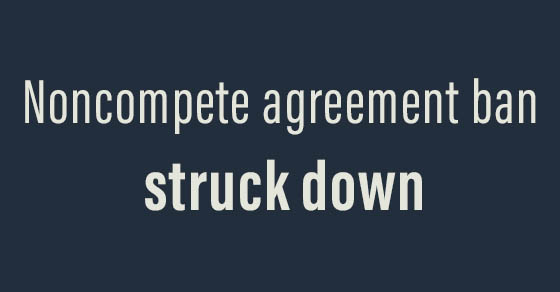
Federal court rejects FTC’s noncompete agreement ban
In April 2024, the Federal Trade Commission (FTC) approved a final rule prohibiting most noncompete agreements with employees. The ban was scheduled to take effect on September 4, 2024, but ran into multiple court challenges. Now the court in one of those cases has knocked down the rule, leaving its future uncertain.
The FTC ban
The FTC’s rule would have prohibited noncompetes nationwide. In addition, existing noncompetes for most workers would no longer be enforceable after it became effective. The rule was expected to affect 30 million workers.
The rule includes an exception for existing noncompete agreements with “senior executives,” defined as workers earning more than $151,164 annually who are in policy-making positions. Policy-making positions include:
- A company’s president,
- A chief executive officer or equivalent,
- Any other officer who has policy-making authority, and
- Any other natural person who has policy-making authority similar to an officer with such authority.
Employers couldn’t enter new noncompetes with senior executives under the new rule.
Unlike an earlier proposed rule issued for public comment in January 2023, the final rule didn’t require employers to legally modify existing noncompetes by formally rescinding them. Instead, they were required only to provide notice to workers bound by an existing agreement — other than senior executives — that they wouldn’t enforce such agreements against the workers.
Legal challenges
On the day the FTC announced the new rule, a Texas tax services firm filed a lawsuit challenging the rule in the Northern District of Texas (Ryan, LLC v. Federal Trade Commission). The U.S. Chamber of Commerce and similar industry groups joined the suit in support of the plaintiff. Additional lawsuits were filed in the Eastern District of Pennsylvania (ATS Tree Services, LLC v. Federal Trade Commission) and the Middle District of Florida (Properties of the Villages, Inc. v. Federal Trade Commission).
The Ryan case is the first to reach judgment. On August 20, 2024, the U.S. District Court for the Northern District of Texas held that the FTC exceeded its authority in implementing the rule and that the rule was arbitrary and capricious. It further held that the FTC cannot enforce the ban, a ruling that applies on a nationwide basis.
Notably, in July 2024, the U.S. District Court for the Eastern District of Pennsylvania denied the plaintiff’s request for a preliminary injunction and stay of the rule’s effective date. It found the plaintiff didn’t establish that it was reasonably likely to succeed in its argument against the ban. By contrast, on August 14, 2024, the U.S. District Court for the Middle District of Florida granted the plaintiff a preliminary injunction and stay. That plaintiff requested relief only for itself, though, not nationwide. But the Ryan ruling means the FTC can’t enforce the ban at all unless it prevails on appeal.
An appeal would be before the conservative U.S. Court of Appeals for the Fifth Circuit, which has become a favorite destination for challenges to President Biden’s policies. Although the court often sides with the challengers, it’s also regularly been reversed by the U.S. Supreme Court.
An FTC appeal could face an uphill battle regardless, though, in light of a recent Supreme Court ruling that reversed the longstanding doctrine of “Chevron deference.” Under that precedent, courts gave deference to federal agencies’ interpretations of the laws they administer. According to the new ruling, however, it’s now up to courts to decide “whether the law means what the agency says.”
The bottom line
For now, the FTC’s noncompete ban remains in limbo and won’t take effect on September 4, 2024. But that doesn’t mean noncompetes aren’t still vulnerable to attack. For example, some private parties are using anti-trust laws to challenge such agreements. And an FTC spokesperson has indicated that the Ryan ruling won’t deter the agency “from addressing noncompetes through case-by-case enforcement actions.”
© 2024